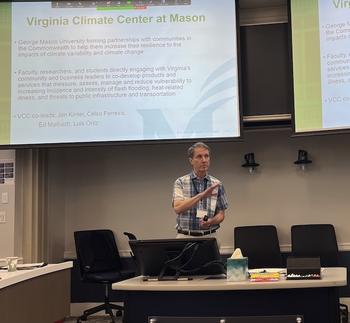The new Virginia Climate Center (VCC) at George Mason University is leading research on tackling climate-related challenges, such as energy, vector-borne illnesses, and extreme weather and flooding in Northern Virginia and throughout the commonwealth. Funded through the National Oceanic and Atmospheric Administration (NOAA) and sponsored by U.S. Representative Gerry Connolly (D-VA), this two-year, congressionally directed community project seeks to increase Virginia’s resiliency to the impacts of climate changes and variability.

“We have high hopes that the Virginia Climate Center will become the go-to resource for communities in the commonwealth to understand their climate risks and find more resilient ways to protect themselves from threats to human health, life, livelihood, and property,” said Jim Kinter, a VCC principal investigator and director of the Center for Ocean-Land-Atmosphere Studies (COLA), a research center within Mason’s College of Science.
“Mason’s VCC has a powerful vision for resilient communities that is catalyzed by the university, advanced through partnerships, and powered by community engagement,” said Andre Marshall, vice president of research, innovation, and economic impact. “This boundary-spanning center is bringing together academic disciplines, municipalities, and the business community to form a new university-based cooperative framework that not only addresses the challenge of resilience, but also establishes a community-engaged model for universities to tackle the grand challenges of our time.”
One of VCC’s current projects is with the City of Alexandria staff to address extreme heat in the region through case studies and data collection of successful adaptation strategies in urban settings, such as cooling centers. Mason experts leading these tasks are Luis Ortiz, Marybeth “MB” Mitcham, Ed Maibach, and Dan Vecellio.
“[This project] will provide my students with the opportunity to explore and contribute to real-time work, as part of exploring public health community assessment and partnership strategies,” said Mitcham, director of Mason’s online master of public health (MPH) program and assistant professor in the Department of Global and Community Health. “Ultimately, our MPH students will help to improve the quality of life of local community members and help promote an awareness of the relationship between climate change and adverse health outcomes.”
The VCC is also working closely with Mason’s College of Engineering and Computing and the Northern Virginia Regional Commission (NVRC) to support the installation of flood sensors and the development of a real-time flood forecasting system for the region. Flooding and extreme weather have devastating impacts on our communities and Virginia’s infrastructure and economy. Studies by Mason researchers predict more intense and stronger storms in our region, stressing our infrastructure and likely increasing the impacts of extreme weather in our area.
P Ruess, a postdoctoral research fellow on the VCC team, is investigating the relationship of road closures and water rescues. “I am excited to work closely with stakeholders in an advisory relationship reliant on direct and intentional stakeholder involvement,” Ruess said.
"My work on the NVRC project holds the potential to greatly benefit our region, the Northern Virginia community, and my own education,” said Zeeshan Khalid, a master’s student in data analytics engineering. “By proactively identifying and addressing road closures during flash floods, we aim to minimize disruption, reduce property losses, and enhance community safety. This project underscores Mason's commitment to contributing positively to the well-being of our community.”
Looking ahead, the VCC will remain in its partnerships with municipalities in Northern Virginia, including the NVRC, City of Fairfax, and Fairfax County, and will continue to work with them to address climate risks and codevelop adaptation solutions.
With the aid of funding from Mason’s Strategic Investment Fund, the VCC team in collaboration with Mason’s Local Climate Action Planning Initiative and the Institute for a Sustainable Earth, is expanding beyond Northern Virginia to aid Virginia’s rural communities in their climate resiliency and, now also, mitigation planning.
In this Story
Related News
This content appears in the Spring 2024 print edition of the Mason Spirit Magazine with the title "Virginia Climate Center Delivers Vital Research and Resources."
